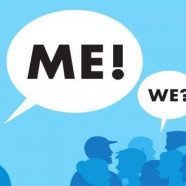
Biden-Harris won, the pandemic is surging, the economy is in ruins, and the pundits are still trying to understand why – including how Trump managed to attract 70 million votes. Behind these historic events is the growing influence from individualism, which helps explain this election and the pandemic. But will this underlying social trend continue to transform those values traditionally associated with brand “America” – e.g. kindness, caring for others/empathy, trust and fairness, integrity and credibility?
Masks for Fighting Covid-19
Nowhere is this rise of individualism more evident and controversial than the issue of wearing masks to contain Covid-19. Pew Research reported recently that 80% of Americans now wear a mask when going outside, but the remaining 20% can potentially trigger widespread infection. According to another survey by Brooking, the primary reason for shunning masks is the strong belief that it is their constitutional right to not have to wear one (40%). The second reason is because it is uncomfortable (24%).
Research has indicated that many Americans basically don’t like being told what to do or being judged. They regard face coverings as an “implied judgment”. The Brookings survey also found that 64% of these insistent Americans believe this right or principle of individualism is more important than reducing the probability of getting sick or infecting others.
This individualistic attitude also helps to explain the Republicans’ attitude toward Covid-19 and also how they readily relate to the egocentric Trump. The Pew Research survey asked both parties how Covid-19 has made their life “difficult or challenging”. Republicans selected “wearing a mask” as number one (19%), and 27% of the respondents with this view expressed skepticism about masks and/or the severity of the pandemic. In contrast, Democrats listed masks as the ninth most challenging (10%), while “family” and “work” were tied for first (21%). In addition, of all those who expressed a worry about others not wearing a mask, 76% were Democrats and the remainder Republicans.
Historic Perspective
Like all trends, this issue of individualism vs. collectivism did not appear overnight. A new book, “The Upswing” by Robert Putnam and Shaylyn Romney Garrett, examines key American social trends since the 1870’s. Until the late 1960’s there was significant social progress – e.g. community activism, more cross-party collaboration, declining income inequality, rising social mobility, increasing social spending on the poor, etc. However, after the Viet Nam war the trend for these American brand values started to reverse itself with collapsing membership in civic organizations, increasing political polarization, widening income inequality, falling religious attendance, and a precipitous drop in social trust, especially for the Government.
Putnam and Garrett concluded that “the crucial change was in mind-set and culture”. The story of the American experiment in the 20th century is one of a long upswing toward increasing solidarity, followed by a steep downturn into increasing individualism. From “I” to “we” and back again to “I”.
Expectations for the Future
Notwithstanding this surprising electoral support for “Trumpism” (48% of votes) and individual rights, many believe Covid-19 will push Americans to the left. Pew Research shows that 59% of Americans think that “Government should do more to solve problems”. And according to a NY Times/Siena poll in October:
- Two-thirds of Americans support allowing people to buy health insurance through the federal government (i.e. the public option)
- Two-thirds support Biden’s $2 trillion plan to increase the use of renewable energy and build energy-efficient infrastructure.
- 72% of Americans (including 56% of Republicans) support another $2 trillion Covid-19 relief package for individuals and state/local governments.
- 82% of voters (including 70% of Republicans) would consider legislation to expand paid family and medical leave.
History shows there may be a pattern where the Government expands to meet a crisis – i.e. the Depression, World War II, the recent financial crisis and maybe now Covid-19. There will always be a strong preference for democratic capitalism and a spiteful dislike of socialism per se, but perhaps the selfish principle of individualism and reluctance for not wearing a mask during this pandemic will sway other Americans to a more collective, community minded culture and values.


